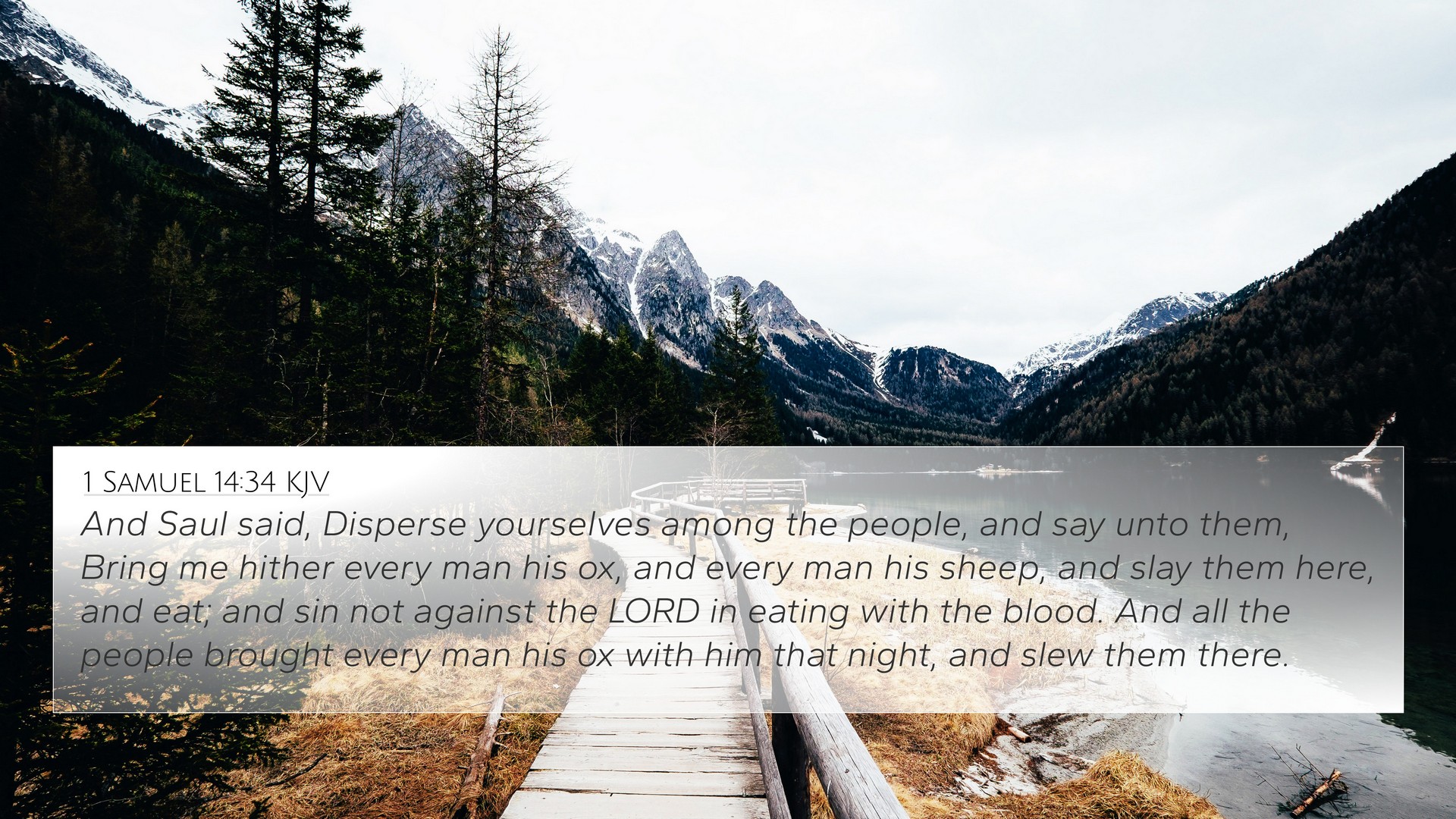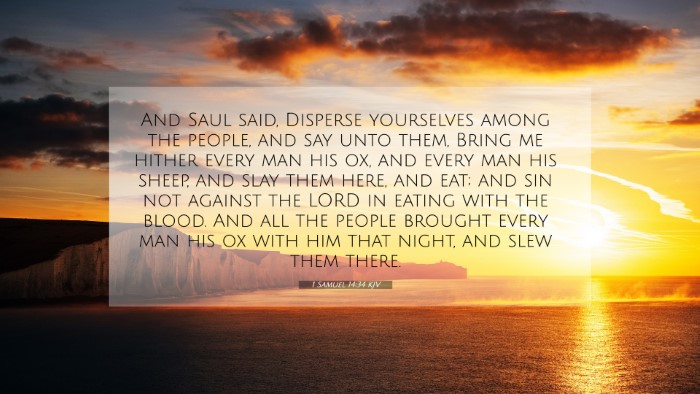Understanding 1 Samuel 14:34
Bible Verse: 1 Samuel 14:34 - "And Saul said, 'Disperse yourselves among the people, and say to them, 'Bring me here every man his ox and every man his sheep; slay them here, and eat; and sin not against the Lord in eating with the blood.' And all the people brought every man his ox with him that night, and slew them there.'
The context of this verse highlights an urgent situation during a battle where Saul, the king of Israel, reacts to the fasting that was occurring among his troops. They were so hungry that they were beginning to eat the meat with the blood, which was against God's law.
Commentary Insights
- Matthew Henry: Henry emphasizes Saul's desire to alleviate the people's hunger and the consequences of their actions in violating God's commands regarding eating blood. Henry notes that Saul's proposal reflects an understanding of the law, yet shows his lack of firm spiritual leadership, as he does not address the immediate spiritual ramifications of their actions.
- Albert Barnes: Barnes points out the issue of blood in the meat, referring to the Jewish dietary laws that forbade the consumption of blood. He notes that Saul’s command to eat without blood represented an attempt to preserve obedience to the Law of Moses, while also dealing with the practical needs of his people in dire circumstances.
- Adam Clarke: Clarke interprets this verse as an insight into Saul's character, showing both concern for the people and a failure to lead them effectively spiritually. He comments on the permissibility of eating meat in a manner that aligns with God's commandments, advocating for a conscientious practice of faith even during times of crisis.
Key Themes and Connections
This verse connects to several broader themes within Scripture, such as obedience to God’s laws regarding dietary practices, leadership accountability, and the serious consequences of hasty decisions in moments of pressure. Below are some relevant cross-references that elaborate on this theme:
- Leviticus 17:10-14 - Discusses the laws against consuming blood and the importance of adhering to these divine directives.
- Deuteronomy 12:16 - Reinforces the prohibition of eating blood, emphasizing respect for God's laws.
- Acts 15:29 - Apostolic edicts advising the Gentile believers, which includes abstaining from blood, linking Old Testament dietary laws to New Covenant instructions.
- Genesis 9:4 - God's command to Noah regarding the consumption of blood illustrates the eternal nature of this law.
- 1 Peter 1:16 - Calls for holiness among God’s people, which can connect back to how they approach food and drink, reinforcing obedience to divine commands.
- Hebrews 9:22 - Discusses the necessity of blood for forgiveness, providing a deeper understanding of why the law surrounding blood consumption carries significant spiritual weight.
- James 1:22 - Encourages believers to be doers of the word, challenging readers to consider how they implement God’s laws in their lives, including dietary restrictions.
Thematic Connections
1 Samuel 14:34 reflects profound themes prevalent throughout the Bible, such as:
- Obedience to God: This theme is echoed throughout Scripture where adhering to God's commandments is fundamental.
- Leadership and Accountability: The responsibility of leaders to guide their people in holiness and righteousness is significant, as seen in Saul’s actions.
- Human Needs and Spiritual Laws: The conflict between physical needs and spiritual mandates often surfaces in various Biblical narratives.
Practical Applications and Reflection
As one reflects on this verse, questions may arise regarding how to balance spiritual integrity with practical needs. The essence of this passage invites believers to consider:
- How do we maintain our spiritual convictions in times of crisis?
- What role does leadership play in guiding others in faith-based decisions?
- How can one incorporate Old Testament laws into modern-day faith practices?
Conclusion
1 Samuel 14:34 serves as a poignant reminder of the principles of obedience, leadership, and spiritual integrity. Through careful scriptural cross-referencing and thematic analysis, we can deepen our understanding of this passage and its implications for our lives today. This process enriches our reading of the Bible and facilitates an inter-Biblical dialogue that strengthens our faith.


